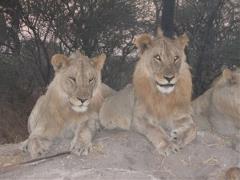Animal Rightists Can’t Win with Facts, so They Make Things Up
The headlines in early July broadcast the tragedy of at least three poachers being eaten by a pride of lions in the famous Sibuya Game Reserve in South Africa.
The event was tragic on several levels, and social media lit up with comments about how the poachers deserved what they got.
 The fact that a black market exists that compels poaching to occur at all is a tragedy. Based on reports, the remains of the bodies were found with an axe – the tool of choice to hack off the horns of rhinos. It is a good bet that the poachers were not after bush meat.
The fact that a black market exists that compels poaching to occur at all is a tragedy. Based on reports, the remains of the bodies were found with an axe – the tool of choice to hack off the horns of rhinos. It is a good bet that the poachers were not after bush meat.
There is another tragedy. The constant attempt by animal rights activists to blur the lines between legitimate hunting and poaching.
The most recent example of that is the headline from Newsner claiming “TROPHY HUNTERES BREAK INTO NATURE RESERVE TO KILL RHINOS – GET EATEN BY LIONS”.
The Newsner article opens with, “Three trophy hunters recently broke into a nature reserve in South Africa. Their goal? To hunt rhinos.”
Newsner continues by claiming the hunters became the hunted when the lions got involved.
As seen time and again, when the facts don’t fit the narrative, make stuff up, or in this case, refer to poachers as “hunters.”
That’s a radically different approach than the one supported by people who actually live in countries where trophy hunting plays a critical part in their economy and wildlife conservation methods.
Several representatives from African countries recently attended the “Keep Calm and Let Africa Take the Lead” conference in Brussels, Belgium. They presented their case that hunting in Africa contributes significantly to wildlife conservation.
Representatives of wildlife management authorities from Zimbabwe, Zambia, Tanzania and other African countries were on hand for a seminar entitled “Where Are We Now? – Elephants, Lions and Leopards” at the 2018 SCI Convention in Las Vegas.
These individuals passionately explained what it is like for the local people who must co-exist daily with these animals. For them, reality is not a picture of a majestic animal, it is ruined crops and homes, daily threats and sometimes lost lives.
In addition to first-hand accounts, there are many studies, white papers and articles discussing the value hunting brings to communities in Africa and around the world.
A 2016 briefing paper on the positive effects of trophy hunting was released by the International Union for the Conservation of Nature (IUCN).
The IUCN is a premier, scientifically oriented organization dedicated to sound conservation policies. Safari Club International Foundation has been a proud member of IUCN since 2016.
Even animal rights groups acknowledge the impact IUCN has in the development of international conservation policy. The IUCN is “the preeminent membership Union, which provides public, private and non-governmental organisations with the knowledge and tools that enable human progress, economic development and nature conservation,” says the International Fund for Animal Welfare website.
Rather than posting incendiary headlines that further justify the recent cry of “fake news,” the authors of articles such as the Newsner piece would be better served by doing a little research into the benefits of hunting rather than promoting their eco-imperialistic view.

